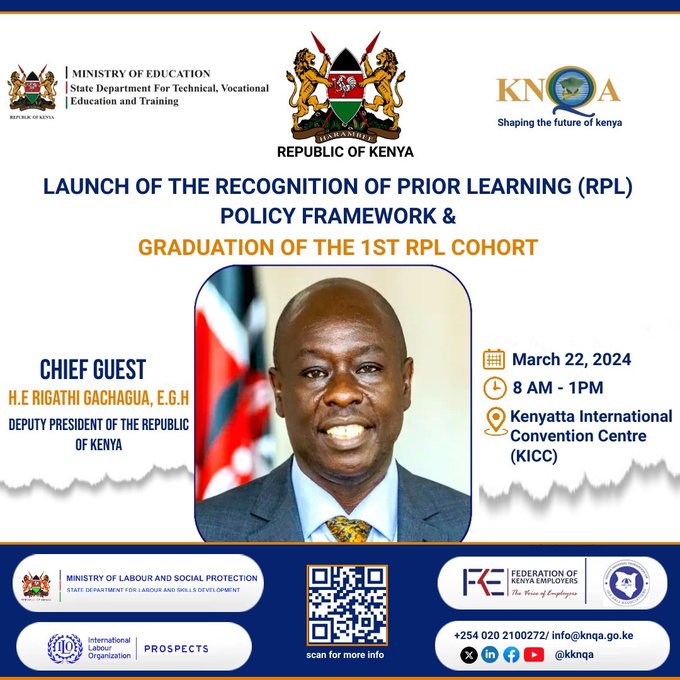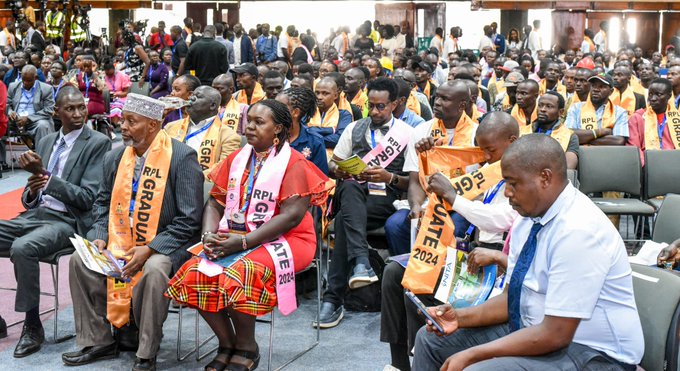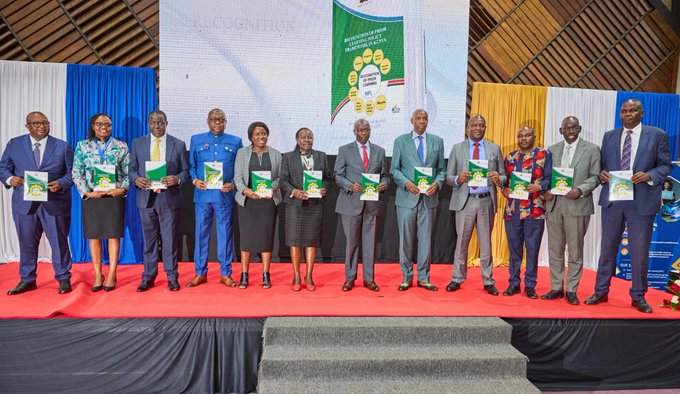Awarding Qualifications in Kenya
All universities are established under the universities Act No. 42 of 2012. All universities are allowed to train, examine and award qualifications (except for constituent colleges, which award qualifications through mentoring universities. Professional Bodies are involved in the accreditation of institutions to train professionals (see www.knqa.go.ke, see also www.cue.or.ke), though a few also award qualifications.
| S/N | Category | No. | Remarks |
|---|---|---|---|
| a) | Public Chartered Universities | 31 | Allowed to train and award qualifications in areas for which they have been accredited by CUE and/or professional bodies (KNQF levels 5 to 10). |
| b) | Public Constitution Colleges | 6 | Allowed to train only Degrees and Diplomas awarded by mentoring universities (KNQF levels 5 to 10). |
| c) | Private Chartered Universities | 18 | Allowed to train and award qualifications in areas for which they have been accredited by CUE and/or professional bodies (KNQF levels 5 to 10). |
| d) | Private Constituent Colleges | 5 | Allowed to train only Degrees and Diplomas awarded by mentoring universities. |
| e) | Institutions with letters of Interim Authority | 14 | Allowed to train and award qualifications for an interim period of 4 years only (KNQF level 5 to 10) |
TVET institutions are established under various acts of parliament. Most TVET institutions in the country are only accredited to train (see tvetauthority.go.ke). Examination and award of qualifications is done mostly through national exam bodies such as KNEC, TVET, CDACC and KASNEB. A number of TVET institutions have their own acts of parliament that allows them to train, examine and award TVET qualifications (see section B-1, B-2 and B-3). The KNEC which carries out the majority of examinations and awarding of qualifications in the TVET sector also collaborates with foreign exam bodies to conduct foreign exams and award foreign qualifications. The National Industrial Training Authority (NITA), trains, examines several level 3 and 4 qualifications.
TECHNICAL AND VOCATIONAL TRAINING SECTOR (TVET)
1. National Examination Bodies
| S/N | Name | Legal mandate | Remarks |
|---|---|---|---|
| 1 | Kenya National Examination Council (KNEC) | KNEC is established under the KNEC Act No. 29 of 2012 to oversee national examinations in Kenya. It conducts basic, and TVET exams. The Council also conducts exams on behalf of foreign exam bodies (see details at www.knec.ac.ke) | Conducts exams in the basic and TVET sectors of Kenya and awards certificates and Diplomas (KNQF levels 3 to 6). Also conducts the following foreign exams in the TVET sector (see www.knec.ac.ke). |
| 2 | Kenya Accountants and Secretaries National Exam Board (KASNEB) | KASNEB is established under the Accountant’s Act No. 15 of 2008, Certified Public Secretaries of Kenya Act, Cap. 534 of 1988 and the Investment and Finance Analysis Act No. 13 of 2015. Its mandate is to develop curricular, and conduct professional, technician and diploma exams and award qualifications in accountancy, finance, credit, governance, management and ICT. | Conducts exams in the TVET (tertiary) sector of Kenya and awards certificates, Diplomas and professional qualifications (KNQF levels 3 to 6). |
| 3 | TVET Curriculum Development Assessment and Certification Council (CDACC) | TVET CDEACC is established under the TVET Act No. 29 of 2013. Its mandate is to develop curricular, and conduct exams, assessment and competence certification in the TVET sector. | Conducts exams, assessment and competence certification in the TVET sector Kenya and awards certificates and diplomas (KNQF levels 3 to 6). |
| 4 | National Industrial Training Authority (NITA) | NITA is established under the industrial training Act Cap. 237 of the laws of Kenya. Its mandate is to train, asses, develop training curricular, examine and award certificates in industrial training. | Accredits institutions, trains, examines and awards qualifications in industrial training (KNQF level 3 and 4). |
2. PROFESSIONAL BODIES AWARDING QUALIFICATIONS IN KENYA
| S/N | Name | Legal mandate | Remarks |
|---|---|---|---|
| 1 | Council for Legal Education (CLE) | CLE is established under the legal education act Cap 16A of 2009. Its mandate is to promote legal education and training; accrediting legal education trainers, training and conducting examinations and awarding academic certificates. | Conducts exams in the legal profession and awards academic certificates. Accredits and caries out quality assurance of institutions carrying out training in the legal profession. |
| 2 | Nursing Council of Kenya (NCK) | NCK is established under the Nurses Act Cap. 257 of the laws of Kenya. Its mandate is (with approval of the Ministry) to make provision for training of persons seeking registration under the act, prescribe and regulate curricular, recommend institutions for accreditation, carry out quality assurance, conduct exams and award qualifications. | Conducts exams in the nursing profession and awards professional certificates. Accredits and carries out quality assurance of institutions carrying out training in the nursing profession (in consultation with the Minister for Health). |
| 3 | Kenya Nutritionists and Dieticians Institute (KNDI) | KNDI is established under the nutritionists and dieticians act No. 18 the 2007 to provide for training, registration and licensing of nutritionists and dieticians; accredit institutions that are training nutritionists and dieticians. | Accredits institutions to carry out training in nutrition and dietetics. Has no mandate to award academic qualifications. |
3. TVET INSTITUTIONS WITH LEGAL MANDATE TO AWARD QUALIFICATIONS
3.1. NATIONAL POLYTECHNICS
| S/N | Name | Legal mandate | Remarks |
|---|---|---|---|
| 1 | Kenya Technical Trainers College (KTTC) | Conducts training, examines and awards TVET qualifications (KNQF levels 3 to 6). | |
| 2 | The Kisumu National Polytechnic | ||
| 3 | The Eldoret National Polytechnic | These institutions are established under the TVET Act of 2013; and under respective orders are mandated to train, and award TVET qualifications. | |
| 4 | The Meru National Polytechnic | ||
| 5 | The Kenya Coast National Polytechnic | ||
| 6 | The North Eastern National Polytechnic | ||
| 7 | The Sigalagala National Polytechnic | ||
| 8 | The Kitale National Polytechnic | ||
| 9 | The Kisii National Polytechnic | ||
| 10 | The Nyeri National Polytechnic | ||
| 11 | The Kabete National Polytechnic |
3.2. TVET INSTITUTIONS IN VARIOUS MINISTRIES
| S/No. | Name | Legal mandate | Remarks |
|---|---|---|---|
| 1 | Bukura Agricultural College (BAC) | Bukura Agricultural College act Revised Edition 2012, (section 4) | To train and award qualification in Agriculture (KNQF levels 3 to 6) |
| 2 | Kenya Water Institute (KEWI) | Kenya Water Institute Act of 2012 (section 4d) | To train and award qualifications in water technology (KNQF levels 3 to 6) |
| 3 | Kenya Forestry College (KFS) | Forest conservation and management Act of 2016 (section 17) | To train and award qualifications in forestry science and technology (KNQF levels 3 to 6) |
| 4 | Wildlife Research and Training Institute | Wildlife conservation and management act no. 47 of 2013; Act No. 19 of 2015; legal notice 105/2017. | To train and award qualifications in wildlife conservation and management (KNQF levels 3 to 6). |
| 5 | Kenya Institute of Mass Communication (KIMC) | Kenya Institute of Mass Communication order, 2011 section 4(d) and (e) legal order no. 197 of 2011. | To train and award qualification in mass communication, media and journalism (KNQF levels 3 to 6). |
| 6 | Kenya Utalii College (KUC) | Established under the Tourism Act, 2011. | To train and award qualifications in food production, hotel and restaurant management/hospitality (KNQF levels 3 to 6). |
| 7 | Kenya Medical Training College (KMTC) | Established under the KMTC Act of 1990. | To train and award qualifications in the medical field (KNQF levels 3 to 6). |
Training for levels 1 & 2 qualifications is carried out through private and public primary and secondary schools accredited by the Education Standards and Quality Assurance Council (ESQAC) (see moe.go.ke). Most of the students sit for and are examined by the KNEC at KNQF level 1 (KCPE) and level 2 (KCSE). The KNEC also collaborates with various foreign exam bodies to administer exams at level 2 (see www.knec.ac.ke). Several schools also conduct KNQF level 2 exams directly with foreign exam bodies from various countries. KNQA equates most university entrance exams to KCSE. For a student who has taken foreign level 2 exams to qualify for direct university entry; they must be qualified for (must pass with same grades) university in the home country of qualification that they have taken.
| S/No | Name | Legal mandate | Remarks |
|---|---|---|---|
| 1 | Kenya National Examination Council (KNEC) | a) KNEC is established under the KNEC Act No. 29 of 2012 to oversee and conduct National Exams in Primary (KNQF level 1) and secondary schools (KNQF level 2). | - Conducts exams in the basic education sector (KNQF levels 1) Kenya Certificate of Primary Education (KCPE); and Kenya Certificate of Secondary Education (KCSE, KNQF level 2) |
| b) KNEC is also mandated by law to collaborate with foreign exam bodies to conduct foreign exams. At KNQF level 2 these include; | - Also conducts foreign exams. | ||
| i) Edul International (EI) – offering GCE/IGCE exams; | |||
| ii) International examinations (CIE) – GCE/IGCE Exams; and | |||
| iii) International Baccalaurate organization (IB Diploma). |
The Kenya Civil Aviation Authority, established under the Civil Aviation Act No. 21 of 2013 approves and regulates aviation training institutions in Kenya; and carries out certification of aircraft operators (section 7(1), (3) and (6)






